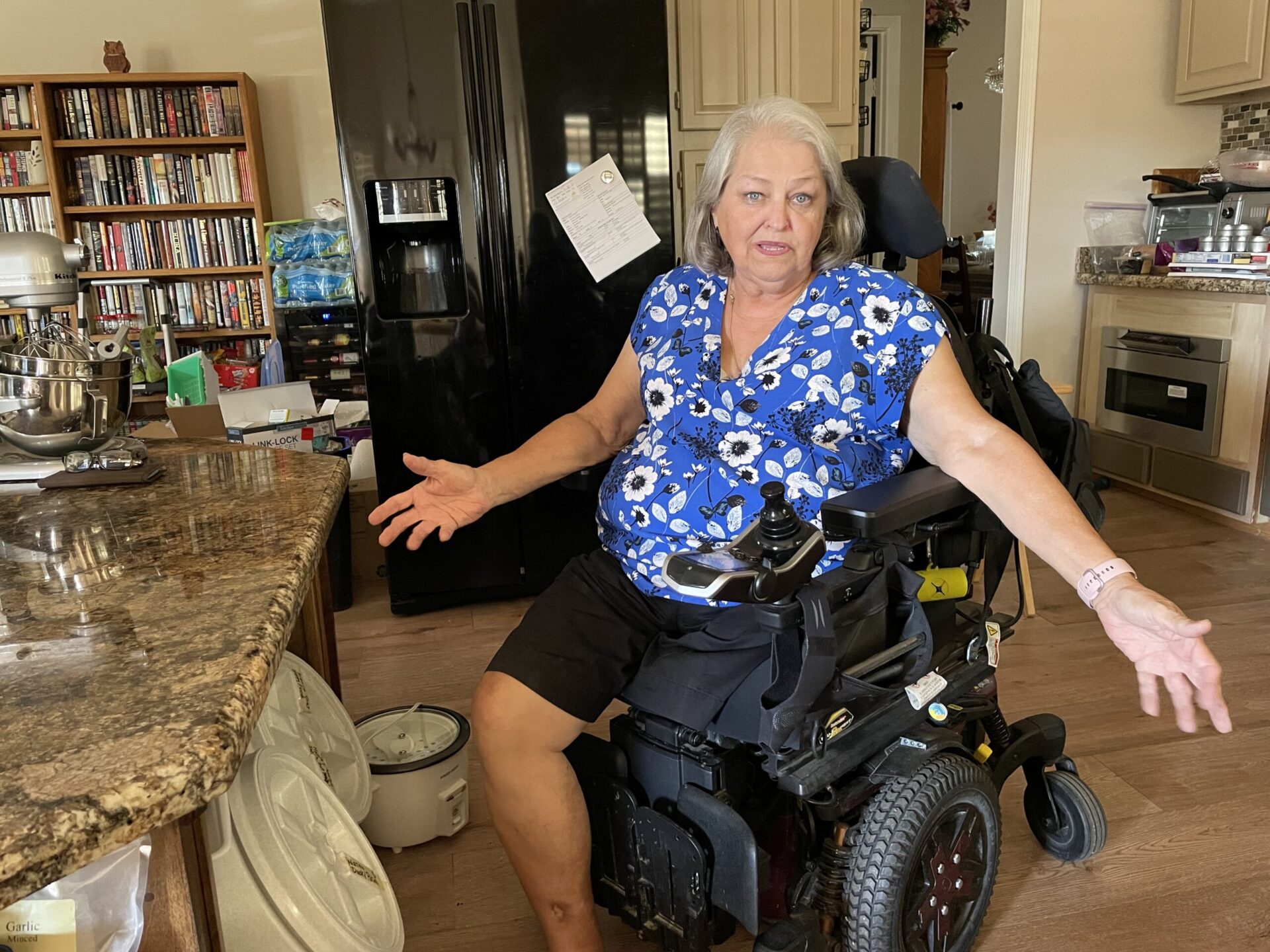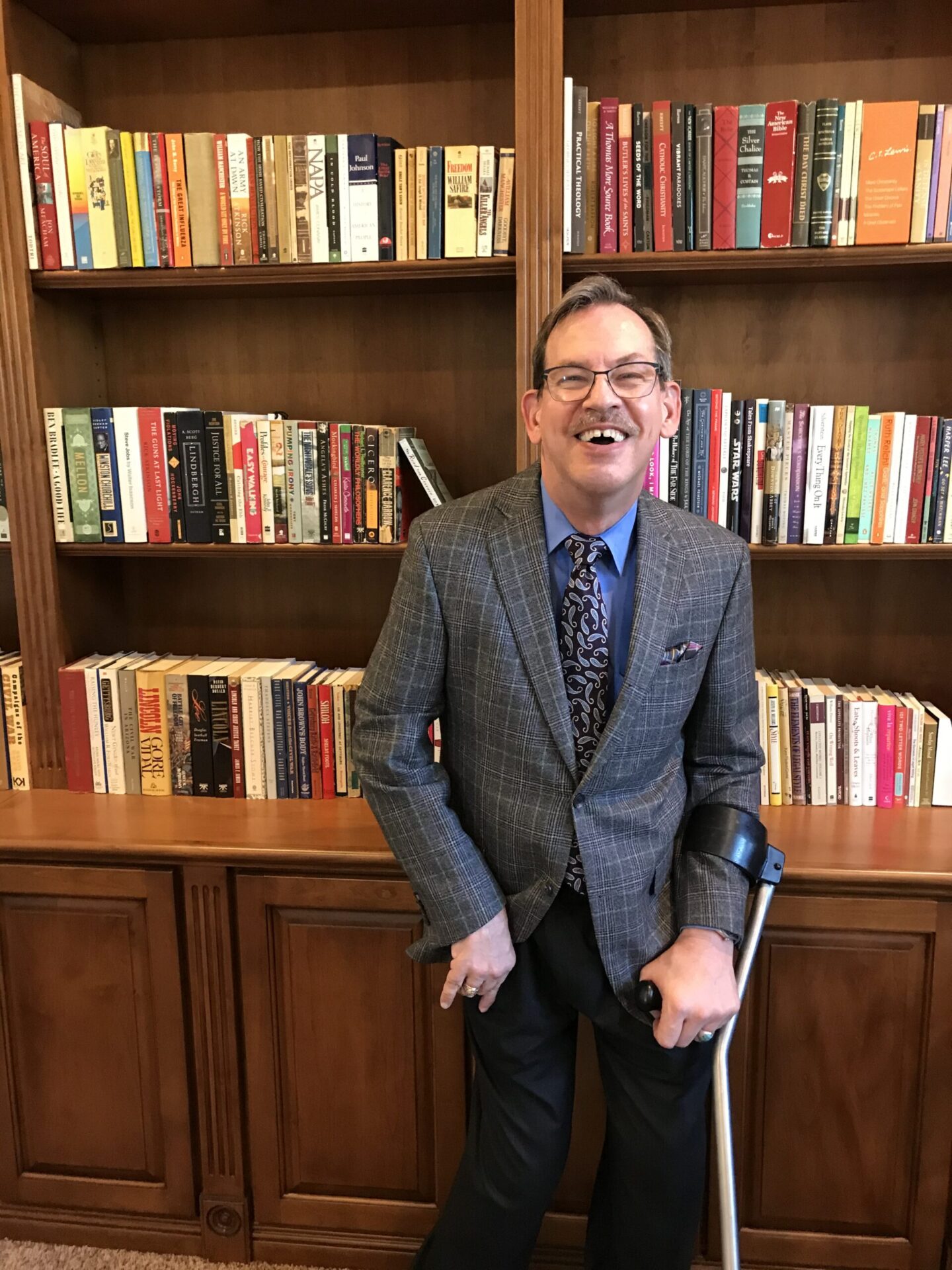
Susan Deaton was a doctoral candidate at Arizona State University in 1994, out riding her bike with her husband one evening when tragedy struck. In the aftermath of a horrific accident, her left leg was amputated.
She’s been in a wheelchair since.
Deaton recently moved into a home in Tempe modified to be accessible for her. A ramp to the front door, a microwave oven in a lower cabinet and a kitchen island she can reach while seated in her wheelchair make life a little easier.
Even with the Americans With Disabilities Act, passed into law 31 years ago, it is anything but easy navigating life with one leg from a seated position. From having to be carried off of an airplane to bathroom-stall doors in restaurants that don’t close all the way, Deaton has experienced firsthand the obstacles and indignities that those without disabilities may never stop to consider.
Her dream of obtaining a Ph.D. also was dashed because of her disability.
“The worst thing was I couldn’t complete my degree because I had to go to the developing world to do the work,” Deaton said.
From Africa to Latin America and throughout less prosperous nations, accessibility was an obstacle.
“Basically, I ended up having to drop out.”
____________________
“I think everybody ought to spend a day in a wheelchair where you cannot use your legs.”
— Susan Deaton of Tempe
____________________
Randall Howe also knows all too well the difficulties of surmounting those obstacles. Born with cerebral palsy decades before the ADA, Howe underwent numerous surgeries. He finally learned to walk when he was 9. He has a speech impediment.
The ADA, he said, made a difference for him on two fronts: accessibility and employment.
When Howe was very young, he had extensive therapy and underwent multiple surgeries.
“You would think that hospitals would have ramps, but as a small child, I remember what a big deal it was that the hospital finally got a ramp,” he said.
Before, he had moved about on a walker his father outfitted with wheels.
“I could get around pretty fast on it,” Howe said.
Eventually, he learned to walk with a forearm crutch. His parents would sometimes have to carry him up stairways. If there was a left-side railing, he could pull himself up, step by step.
“It wasn’t easy,” Howe said.
The local school wouldn’t allow Howe to enroll, even after he scored 129 on an IQ test, so his mother drove him across town to attend class. She reminded him to study hard because, unlike other kids, who might not apply themselves to their schoolwork, he couldn’t dig ditches for a living.
When Howe began his college degree, he told his academic advisor his plan was to major in history and then go on to ASU’s law school. She doubted the wisdom of such an endeavor and encouraged him to get a business degree instead to improve his job prospects.
Today, those kinds of discriminatory attitudes and scenarios seem unthinkable, but they weren’t so unusual prior to the ADA. The sweeping civil-rights law enacted in 1990 prohibits discrimination against people with disabilities, assuring them equal opportunity, full community participation, independent living and economic self-sufficiency.
Howe, who ranked first in his undergraduate class at ASU, did indeed go on to law school, where he excelled. Even so, he had difficulty securing a job. He looked good on paper, but once prospective employers noted his disability, they lost interest.
At the time, it didn’t seem so unusual to Howe. He says he’d bought into the idea that he could never be in the courtroom.
“The attitude that I had and that was cast down to me was that I was lucky to get as far as I did because people with disabilities weren’t viewed as capable employees,” Howe said.
He finally was hired but even then there were demeaning comments, such as a partner telling Howe he wouldn’t meet with prospective clients initially since they would need to be “prepared” regarding his disability.
When the firm went belly-up, Howe had to go job hunting again. He interviewed with a national law firm.
“The partner who interviewed me said, ‘How are you going to get around your disability in the courtroom?’ That was not an inappropriate question before the ADA,” Howe said.
Howe then applied to the Arizona Attorney General’s Office, where the culture was more open minded.
“They had a completely different attitude. They gave me a case and told me, ‘Go do it,’” Howe said.
“It ruined the idea that I couldn’t be in the courtroom, that I couldn’t do litigation.”

In 2001, Howe was named chief counsel of the criminal appeals section at the AG’s office. He hired four attorneys to work for him, each with various physical disabilities. Two had multiple sclerosis, one was deaf and the fourth had muscular dystrophy.
“They were all more than capable of doing the job,” Howe said. “I think that before the ADA, those people would have had a lot harder time finding jobs. I know that I did.”
To understand how seemingly unsurmountable a barrier Howe has overcome, he has argued a case before the U.S. Supreme Court, a complete vindication for a man others doubted could ever hold forth in a courtroom.
That the ADA prohibits discrimination against people with disabilities and requires that public facilities are accessible to the disabled is life-changing for Howe and millions of other Americans.
As a younger man, Howe was active, going to school and out into the community, he says.
“But if it was somewhere unfamiliar, I would have to call ahead,” Howe said. “I would have to plan how I would get around the various physical obstacles.
“It’s a great thing for me that I don’t have to think about that.”
For nearly 20 years, he’s used an electric scooter to get around. And to those who might complain that handicapped parking spots take too much space or seem like overkill, he encourages them to see another perspective.
“For most people, if they have to walk a little bit from their parking space to the store or the door, it’s really not that big of a deal,” Howe said.
For him to be able to park close enough to the door often determines whether he goes in at all. If he really needs to buy something and he can’t park close to an entrance, he said he has to weigh how much he’s willing to exhaust himself to get inside.
“The more accessible a building is, the more apt people with disabilities are going to go into the building and patronize it.”
____________________
“The attitude that I had and that was cast down to me was that I was lucky to get as far as I did because people with disabilities weren’t viewed as capable employees.”
— Randall Howe, Arizona Court of Appeals judge
____________________
For Deaton, who became disabled four years after passage of the ADA, the view from a wheelchair is a bit different than Howe’s. An observer wouldn’t necessarily describe Deaton as “confined to a wheelchair,” for starters.
Energetic, articulate and assertive, she wheels around her new Tempe digs with gusto, navigating piles of boxes and cartons of belongings that still need to be unpacked, while chatting on her cell phone about an insurance matter. She’s a woman of deep faith who doesn’t feel sorry for herself and isn’t afraid to speak her mind.
Deaton said that the little things like ramps, handicapped parking and accessible bathrooms make a big difference but they’re not a cure-all.
She can’t get to the pool pump in her backyard because the cool deck is too narrow to allow for her wheelchair.
She mentioned difficulties shopping at a grocery store in Tempe where she’s been told all the checkout lanes are handicapped accessible.
“Oh, no, they’re not,” Deaton declared.
Just listening to her description of the ordeal of placing her items on the belt for checkout is exhausting.
“I can barely get my wheelchair going in there,” she said. “In order to unload my groceries, I have to go in backwards, pull the front of the cart in, unload as much as I can, push my cart back out into the main aisle, turn my cart around, turn my wheelchair around, and then push the cart in and push me in to be able to unload the back part of the cart.
“It’s a nightmare.”
She’s asked to speak with the store manager several times, but he or she is “never available.”
Pausing to consider the various difficulties she’s encountered as a person with disabilities the last 27 years, she recalls the day her cohort of fellow patients at a local rehabilitation center were to make their first foray into public.
“I learned that day that I became a non-person,” Deaton said.
While pedestrians who pass each other on the street are normally cordial, nodding or exchanging a greeting, she noticed that things were different after the amputation.
“When you are disabled and in a wheelchair, they turn their heads away from you. They deliberately make sure that they can’t see you,” Deaton said.
“I am certain that has to do with their fears of disability.”
And as for handicapped-accessible restrooms, Deaton has found several where she can get her wheelchair into the stall but then the door won’t close.
“I have just as much right to privacy as the next person,” Deaton said.
People mean well, she added, but they don’t quite get what life is like for the disabled.
“I think everybody ought to spend a day in a wheelchair where you cannot use your legs.”


